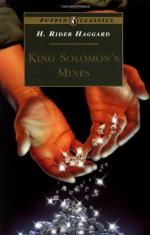Good responded nobly to this tax upon his inventive faculties. Never before had I the faintest conception of the breadth and depth and height of a naval officer’s objurgatory powers. For ten minutes he went on in several languages without stopping, and he scarcely ever repeated himself.
Meanwhile the dark ring crept on, while all that great assembly fixed their eyes upon the sky and stared and stared in fascinated silence. Strange and unholy shadows encroached upon the moonlight, an ominous quiet filled the place. Everything grew still as death. Slowly and in the midst of this most solemn silence the minutes sped away, and while they sped the full moon passed deeper and deeper into the shadow of the earth, as the inky segment of its circle slid in awful majesty across the lunar craters. The great pale orb seemed to draw near and to grow in size. She turned a coppery hue, then that portion of her surface which was unobscured as yet grew grey and ashen, and at length, as totality approached, her mountains and her plains were to be seen glowing luridly through a crimson gloom.
On, yet on, crept the ring of darkness; it was now more than half across the blood-red orb. The air grew thick, and still more deeply tinged with dusky crimson. On, yet on, till we could scarcely see the fierce faces of the group before us. No sound rose now from the spectators, and at last Good stopped swearing.
“The moon is dying—the white wizards have killed the moon,” yelled the prince Scragga at last. “We shall all perish in the dark,” and animated by fear or fury, or by both, he lifted his spear and drove it with all his force at Sir Henry’s breast. But he forgot the mail shirts that the king had given us, and which we wore beneath our clothing. The steel rebounded harmless, and before he could repeat the blow Curtis had snatched the spear from his hand and sent it straight through him.
Scragga dropped dead.
At the sight, and driven mad with fear of the gathering darkness, and of the unholy shadow which, as they believed, was swallowing the moon, the companies of girls broke up in wild confusion, and ran screeching for the gateways. Nor did the panic stop there. The king himself, followed by his guards, some of the chiefs, and Gagool, who hobbled away after them with marvellous alacrity, fled for the huts, so that in another minute we ourselves, the would-be victim Foulata, Infadoos, and most of the chiefs who had interviewed us on the previous night, were left alone upon the scene, together with the dead body of Scragga, Twala’s son.
“Chiefs,” I said, “we have given you the sign. If ye are satisfied, let us fly swiftly to the place of which ye spoke. The charm cannot now be stopped. It will work for an hour and the half of an hour. Let us cover ourselves in the darkness.”
“Come,” said Infadoos, turning to go, an example which was followed by the awed captains, ourselves, and the girl Foulata, whom Good took by the arm.




